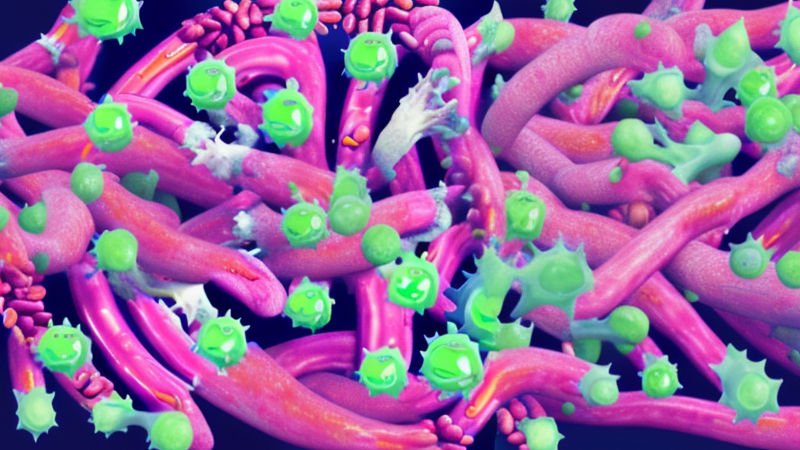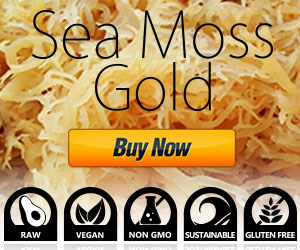Sea Moss, as a specific species of seaweed, has been found to help with a range of gut related issues, including treating leaky gut syndrome by promoting mucosal gut healing.
The science suggests that this is the result of the presence of polysaccharides, and an abundance of necessary minerals.
Have you considered making seaweed a part of your routine? If not, this is something you may wish to discuss further with a suitably qualified professional first.
Hopefully, the content shared here helps you to enter into an informed discussion with someone who can appropriately advise you based on your specific needs with treating leaky gut syndrome.
Table of Contents
Treating Leaky Gut Syndrome with Sea Moss
Could this seaweed hold the key to unlocking an accessible and functional food based solution to help with treating leaky gut syndrome? In this article we’ll consider the research. But first, we need some clarity on what Sea Moss actually is.
Getting to Know Your Sea Moss
As a type of seaweed, it has been gifted with something of a generic name that has been loosely applied to a number of seaweed species including:
- Gracilaria 1
- Eucheuma Cottonii, (considered a synonym of Kappaphycus Alvarezii) and 2
- Eucheuma Denticulatum. 3
There has been significant confusion along the way regarding the distinctions between Sea Moss and Irish Moss Seaweed. This has largely been the result of the commercialisation of seaweed as a product.
What is typically known as Irish Moss Seaweed is a species known as Chondrus Crispus. This is seaweed with a flatter structure that is more like sea lettuce than the other species listed above.
The species of seaweed that are known to be used in the Caribbean and surrounding areas, as spoken of by Doctor Sebi and Lisa Lopes, are more likely to be Gracilaria or Eucheuma Cottonii than Chondrus Crispus. This is based on the visual characteristics of what was demonstrated in an old video where a sample of seaweed was referred to as Chondrus Crispus.
You may find some interesting perspectives as you explore this conversation further in:
- What Is Chondrus Crispus? 8 Amazing Facts You Didn’t Know!
- How To Spot Fake Sea Moss 4 Tips To Buy The Real Deal
- Uncovering The Wildcrafted Sea Moss Myth
- What Is Wildcrafted Sea Moss? Is It Good For Our Planet?
Gracilaria and Eucheuma Cottonii species grow in typically warmer ocean waters, unlike Chondrus Crispus which prefers cooler ocean waters.
To avoid any conflagration arising from tribalism over which species is better than the other, I will make the point of saying that every species of seaweed brings something unique to the table. I do not believe that one is any better than another. They are simply different, with different use cases and potentials.
Eucheuma Denticulatum is much less likely to appear as a species of seaweed that people are flocking to for health benefits. It is still widely used on a commercial scale in a range of food manufacturing. 4
Eucheuma Denticulatum lacks the characteristics that make Gracilaria and Eucheuma Cottonii the preferred spices. 5
How Sea Moss Promotes a Healthy Colon and Gut Function
Many who suffer from Inflammatory Bowel Disease (IBD), sometimes referred to as Chron’s Disease or ulcerative colitis, will know all too well the complications that are faced daily.
Intestinal inflammation resulting in a shortening of the colon, uncontrolled weight loss, diarrhea, and discharges of bloody mucous are just some of the (more than) unpleasant challenges.
But recent research into the benefits of Eucheuma Cottonii has shown that there is hope for people in such a situation. Certain varieties of Sea Moss have proven to be polysaccharide rich, and under controlled testing have yielded some interesting results. 6
Eucheuma Cottonii has been found to help with mucosal gut healing and address a range of complications through the properties it possesses. Some of those properties include it being:
These are complications that need to be addressed that have developed as a part of the fast-paced modernisation of the world, and the adoption of highly processed foods from a predominantly Western diet in many countries.
A plant-based whole-food diet that is supplemented with Sea Moss offers more than many people commonly know. It is popularly believed to be packed with a staggering 92 of the 102 minerals found in the human body, Sea Moss is a marine vegetable that the world is slowly waking up to.
If you want to know more about how seaweed may play a part in treating leaky gut syndrome, take a look at:
- Fixing Leaky Gut With Irish Sea Moss
- 10 Amazing Benefits Of Seamoss Gel And Whole Leaf Seaweed
- Is Carrageenan Bad For You? 3 Fascinating Facts You Should Know
Our Sea Moss Ultimate Guide is also a jam-packed resource worth taking a look at!
Looking at Leaky Gut What is the Cause?
Leaky gut, also known as intestinal permeability, is thought to be caused by a variety of factors, including: 10 11 12
- Chronic stress
- Inflammation
- Infections (such as bacterial overgrowth)
- Certain medications (such as antibiotics and non-steroidal anti-inflammatory drugs)
- Consuming a diet high in processed foods and refined sugars
- Exposure to toxins and pollutants
- Certain medical conditions (such as celiac disease and Crohn’s disease)
It’s important to note that while these factors may contribute to the development of a leaky gut, the exact cause is not well understood and may vary from person to person.
What Happens if Leaky Gut Goes Untreated?
If a leaky gut goes untreated, it can lead to several health issues. These include:
- Chronic inflammation
- Nutrient malabsorption
- A leaky gut can make it difficult for the body to absorb vital nutrients from food, leading to deficiencies and related health problems. 15
- Immune dysfunction
- The gut is closely linked to the immune system, and a leaky gut can disrupt the balance of good and bad bacteria in the gut, leading to an overactive immune response and increased susceptibility to infections and other immune-related disorders. 16
- Neurological issues
- Skin issues
- Leaky gut has been linked to skin issues such as eczema, psoriasis, and acne. 19
It is important to note that these are just some of the potential effects of untreated leaky gut and it is not a well-established and proven causal relationship. Also, it is a complex and multifactorial process, and the symptoms of a leaky gut can vary widely from person to person.
Can Leaky Gut be Cured Permanently?
While there is no known “cure” for leaky gut, certain lifestyle, and dietary changes can help to improve gut health and reduce the symptoms and potentially work towards treating leaky gut syndrome.
A diet that is rich in nutrient-dense foods and low in processed foods and refined sugars can help reduce inflammation and promote the growth of beneficial gut bacteria. Consuming probiotics, fermented foods, and prebiotics can also help to improve gut health. 20
Managing stress levels through exercise, yoga, and meditation can also help to reduce inflammation and improve gut health. 21
Some supplements may be beneficial such as glutamine, quercetin, zinc carnosine, and N-acetylglucosamine which may help to reduce inflammation, repair the gut lining, and promote the growth of beneficial bacteria. 22 23
It’s important to note that healing the gut and reducing symptoms of a leaky gut can take time and will require an ongoing commitment to lifestyle and dietary changes. Additionally, working with a healthcare professional such as a gastroenterologist or a functional medicine practitioner can help create an individualised treatment plan.
It is also important to note that there is limited evidence to support the effectiveness of these interventions, and like with many complementary therapies and methodologies, mainstream medicine believes that further research is still needed.
Traditional Medicine Remedy for Leaky Gut Syndrome
Some may argue that there are no recognised traditional medicine-based remedies that are specifically used for treating leaky gut syndrome.
This stance is taken based on it not being considered a widely recognised medical condition, but a hypothetical condition. However, some traditional medicine practices may be used to address symptoms or underlying causes that may contribute to leaky gut. 24
Traditional Chinese Medicine (TCM) practitioners may use herbal formulas to address gut-related issues, such as abdominal pain, bloating, and diarrhea. They may also use acupuncture to help reduce inflammation and promote healing in the gut. 25
Ayurvedic Medicine practitioners may use herbal remedies, such as Triphala, which is a combination of three fruits that is believed to help improve digestion, and licorice root, which is believed to help with soothing and promote healing of the gut lining. 26
How is Sea Moss Helping with Treating Leaky Gut Syndrome?
In a previous article where we explored how seaweeds, like Sea Moss, could play a part in fixing leaky gut, we considered the research into the presence of polysaccharides. These serve as a food source for the good gut bacteria in your digestive system.
Without a reliable food source for them, they are likely to turn on their host and cause damage to the mucosal lining, which in turn, accelerates the onset of leaky gut. 27 28 29
Non-Invasive Ways of Treating Leaky Gut Syndrome
Leaky gut syndrome is a complex condition and treatment may vary depending on the underlying causes. Some non-invasive strategies that may help with treating leaky gut syndrome may include:
- Eating an anti-inflammatory nutrient nutrient-dense diet
- Taking supplements
- Probiotics and prebiotics
- Managing stress, and
- Avoiding food triggers
Eating an Anti-inflammatory Nutrient Dense Diet
Eating an anti-inflammatory nutrient-dense diet can help with treating leaky gut syndrome by addressing some of the underlying causes of the condition, such as chronic inflammation.
The gut is lined with a barrier that helps to protect the body from harmful substances and microorganisms in the gut. When this barrier is damaged, it leads to increased gut permeability.
Inflammation is one of the main causes of damage to the gut barrier, and an anti-inflammatory diet may help to reduce this inflammation and promote healing.
An anti-inflammatory diet is rich in fruits, vegetables, lean protein, healthy fats, and whole grains, and low in processed foods, added sugars, and unhealthy fats.
These foods provide the body with a wide range of nutrients, antioxidants, and anti-inflammatory compounds that may help to reduce inflammation in the gut, improve gut health, and promote healing.
Additionally, an anti-inflammatory diet may help to reduce food sensitivities and allergies, which may contribute to leaky gut. By eliminating foods that may be causing inflammation in the gut, you can help reduce symptoms and improve overall gut health.
Taking Supplements
Taking supplements may be beneficial in treating leaky gut syndrome by addressing some of the underlying causes of the condition, such as inflammation and gut barrier dysfunction. Some supplements that may help treat leaky gut include:
- L-glutamine
- An amino acid that is important for maintaining gut barrier function and reducing inflammation in the gut.
- Quercetin
- A flavonoid that has anti-inflammatory properties and may help to strengthen the gut barrier.
- N-acetyl glucosamine
- A natural compound that is important for the repair and maintenance of the gut lining.
- Probiotics
- Beneficial bacteria that live in the gut can help to improve gut health and restore balance to the gut microbiome.
- Zinc
- A mineral that is important for gut health and plays a role in healing the gut lining.
It’s essential to note that before taking any supplements, speaking with your trusted healthcare professional to determine if they are appropriate for you and to ensure that they are considered in line with any medications you may already be taking is important.
Some supplements may have side effects, and some may not be suitable for certain people, such as pregnant or breastfeeding women, and some may interact with existing medication in a counterproductive way.
Probiotics and Prebiotics
Probiotics and prebiotics are beneficial in treating leaky gut syndrome by promoting a healthy balance of gut bacteria, which can improve gut health and reduce inflammation.
Probiotics are beneficial bacteria that live in the gut and can help to improve gut health by restoring balance to the gut microbiome. They can be found in fermented foods such as yogurt, kefir, sauerkraut, and kimchi and also can be taken as a supplement.
Consuming probiotics through food or supplements may help to reduce inflammation in the gut, improve gut barrier function, and promote healing.
Prebiotics, such as long-chain polysaccharides, may also provide support. Long-chain polysaccharides are a type of prebiotic that is not digested in the small intestine and instead pass through to the large intestine, where they act as food for beneficial gut bacteria, such as bifidobacteria and lactic acid bacteria.

These beneficial bacteria then ferment the long-chain polysaccharides and produce short-chain fatty acids, which are important for maintaining gut health.
Long-chain polysaccharides are found in a variety of plant-based foods, such as Jerusalem artichokes, onions, garlic, leeks, asparagus, bananas, and Sea Moss! They can also be found in whole grains, such as oats and barley.
Some examples of long-chain polysaccharides include inulin, fructooligosaccharides (FOS), and resistant starches. These compounds are not broken down by human enzymes and thus, reach the colon where they are fermented by the gut microbiome. 30
They promote the growth of beneficial bacteria, and in turn, help to balance the gut microbiome, boost immunity, promote regular bowel movements, and may improve gut barrier function.
There are other types of prebiotics in addition to long-chain polysaccharides. Some examples include:
- Short-chain fatty acids (SCFAs)
- These are produced by the fermentation of non-digestible carbohydrates by gut bacteria. They have been found to have a wide range of health benefits, including reducing inflammation, improving gut barrier function, and promoting a healthy balance of gut bacteria. 31
- Oligosaccharides
- These are short chains of carbohydrates that are not digested in the small intestine and reach the colon where they are fermented by gut bacteria. Oligosaccharides can be found in a variety of vegetables. 32
- Xylooligosaccharides (XOS)
- These are a type of prebiotic that can be found in foods such as corn, wheat, and barley. 33
- Galactooligosaccharides (GOS)
- These are a type of prebiotic that can be found in foods such as beans, lentils, and chickpeas. 34
It’s worth noting that prebiotics alone are not a substitute for a healthy balanced diet and lifestyle. They should be considered in conjunction with other lifestyle changes, such as eating an anti-inflammatory diet, avoiding food triggers, and managing stress, to help improve gut health and treat leaky gut syndrome.
Together, probiotics and prebiotics can help to improve gut health, reduce inflammation, and promote healing.
It’s worth noting that while consuming prebiotics, such as long-chain polysaccharides, can be beneficial for gut health, they may not be appropriate for everyone, so seek specialist advice first!
Managing Stress
Managing stress can be beneficial in treating leaky gut syndrome as it can have a direct impact on gut health. Stress can disrupt the balance of gut bacteria, increase inflammation, and damage the gut lining which can lead to increased gut permeability.
When the body is under stress, it releases stress hormones such as cortisol and adrenaline, which can affect gut motility, decrease blood flow to the gut, and increase inflammation in the gut.
These changes can lead to symptoms such as abdominal pain, diarrhea, and constipation, and can also exacerbate existing gut issues, such as leaky gut syndrome.
Managing stress through techniques such as meditation, yoga, deep breathing, exercise, and mindfulness can help to reduce the production of stress hormones, improve gut motility, and reduce inflammation in the gut. This can help to improve gut health, reduce symptoms of leaky gut, and promote healing.

It’s worth noting that stress management is a personal and subjective process. What works for one person may not work for another. It’s important to keep an open mind and try different techniques and find a method that works best for you. It’s also important to consult with a healthcare professional or a therapist if you are experiencing severe stress or if you have been diagnosed with an anxiety disorder.
Avoiding Food Triggers
Avoiding food triggers can be beneficial in treating leaky gut syndrome because certain foods can exacerbate symptoms and contribute to gut inflammation. Identifying and avoiding these triggers can help to reduce inflammation in the gut and promote healing.
Common food triggers that may exacerbate leaky gut symptoms include gluten, dairy, soy, corn, and refined sugar. These foods can be difficult to digest and can cause inflammation in the gut, leading to increased gut permeability.
Additionally, some people may have food sensitivities or allergies, that can contribute to leaky gut symptoms. These sensitivities can cause an immune response in the gut, leading to inflammation and damage to the gut lining.
It’s important to identify and avoid foods that trigger symptoms. An elimination diet may help identify food triggers. This involves removing certain foods from the diet for some time and then slowly reintroducing them to see how they affect symptoms.
An elimination diet should be done under the guidance of a healthcare professional to ensure that you are getting all the necessary nutrients.
It’s worth noting that avoiding food triggers may not be a long-term solution, and once the gut is healed, some of these foods can be re-introduced in small amounts.
FAQs
What is the Fastest way to Heal Leaky Gut?
Some people may find products that they claim heal leaky gut in 2 weeks, but this is inconclusive in the eyes of many medical professionals. However, it is worth keeping in mind that this is all relative to the extent of the damage your body has been exposed to, and how long too.
There is no one definitive answer on the fastest way to heal a leaky gut, as different people may respond differently to different treatments. However, some strategies that may help to speed up the healing process include:
• Eating an anti-inflammatory diet
• Taking supplements
• Probiotics and prebiotics
• Managing stress, and
• Avoiding food triggers.
It’s worth noting that treating leaky gut syndrome may take time, and it’s essential to work with a healthcare professional to create a personalised treatment plan that’s right for you.
It’s also essential to remember that everyone’s gut is different and so is the healing process, some people may respond better to certain treatments than others, and for some, it may take longer to heal.
Can you Reverse Leaky Gut Syndrome?
Knowing how to cure leaky gut at home can help you take empowered steps along your road to recovery much quicker.
However, it is worth noting that the mainstream medical consensus is that leaky gut syndrome is a complex condition that may have multiple causes and contributing factors.
While it’s not always possible to completely reverse a leaky gut, many people can improve their symptoms and strengthen their gut lining through a combination of lifestyle changes and natural remedies.
The strategy of treating leaky gut syndrome includes addressing the underlying causes, such as chronic inflammation, poor diet, stress, and certain medications. Once these underlying causes are identified and addressed, it’s possible to implement a comprehensive treatment plan that may help to improve gut health and reduce symptoms.
It’s important to note that healing a leaky gut may take time and effort, and it’s essential to work with a healthcare professional to create a personalised treatment plan. While it may not be possible to completely reverse the condition, many people can improve their symptoms and overall gut health.
What Naturally Heals Leaky Gut?
There is no one answer as to what naturally helps your body to heal the damage it has been exposed to and repair a leaky gut. Everyone is different from the next person and may respond differently to different treatments.
What are the Symptoms of Gut Leakage?
One of the signs leaky gut is healing is a reduction in the experienced symptoms. When experiencing the symptoms of leaky gut diet is a trigger for many people that make the pain all too real.
The symptoms of leaky gut syndrome can vary widely and can be similar to those of other conditions. Some common symptoms associated with leaky gut include:
• Abdominal pain and bloating
• Gas and diarrhea
• Fatigue and weakness
• Skin rashes or other skin problems
• Joint pain or arthritis
• Mood swings and brain fog, and
• Food sensitivities or allergies.
It’s worth noting that some of these symptoms are non-specific and can be caused by other underlying conditions. Therefore, it’s essential to consult with a healthcare professional for proper diagnosis and treatment. It’s also worth noting that some people with leaky gut may not experience any symptoms at all, making it harder to diagnose.
How do I Test for Leaky Gut at Home?
Figuring out how to test for leaky gut at home is tricky. Some self-tests can be done at home that may indicate the presence of a leaky gut, such as the lactulose mannitol test and the stool zonulin test, but these are not considered to be definitive tests and should not be used to diagnose a leaky gut. 35
Keep in mind that leaky gut syndrome is not a widely recognised medical condition and is not typically diagnosed by a single test. Instead, it is typically diagnosed based on a combination of symptoms, medical history, and other factors.
Is Leaky Gut Syndrome Genetic or Acquired?
Leaky gut syndrome is not considered to be a genetic condition, but rather an acquired one. It is thought to be caused by a combination of factors, including chronic inflammation, poor diet, stress, and certain medications.
Additionally, certain underlying health conditions, such as celiac disease or Crohn’s disease, can contribute to the development of a leaky gut.
Conclusion
You should be able to take steps to reduce the noticeable severity of symptoms when you are seeking and following guidance from a suitably qualified professional capable of treating leaky gut syndrome. You may even find that you can deal with a lot of the triggers yourself.
In general, traditional medicine practitioners offerings assistance in treating leaky gut syndrome may use various remedies, such as herbal formulas and dietary recommendations to address gut-related issues and help improve gut health.
It’s important to work with a qualified and trusted practitioner who can provide personalised recommendations based on your specific needs and health condition. It’s also worth noting that some traditional medicine practices may or may not be backed by scientific research, and it’s always important to consult with your trusted healthcare professional before trying any new treatment or remedy, whether you are considering treating leaky gut syndrome yourself, or something else.
References
- “Gracilaria Greville, 1830” – World Register of Marine Species, 21 December 2004, [WoRMS] [Archive] ↩︎
- “Eucheuma Cottonii Weber-van Bosse, 1913” – World Register of Marine Species, 13 August 2010 [WoRMS] [Archive] ↩︎
- “Eucheuma denticulatum (N.L.Burman) Collins & Hervey, 1917” – E. Fondo, 22 June 1998 [WoRMS] [Archive] ↩︎
- “Livelihood aspects of seaweed farming in Rote Island, Indonesia” – M. Mariño, A. Breckwoldt, M. Teichberg, A. Kase, H. Reuter, September 2019 [ScienceDirect] [Archive] ↩︎
- “Understanding diseases and control in seaweed farming in Zanzibar” – D. B. Largo, F. E. Msuya, A. Menezes, 2020 [FAO] [Archive] ↩︎
- “Dietary polysaccharide-rich extract from Eucheuma cottonii modulates the inflammatory response and suppresses colonic injury on dextran sulfate sodium-induced colitis in mice” – S. Sudirman, Y. H. Hsu, J. L. He, Z. L. Kong, 5 October 2018 [POLSOne] [Archive] ↩︎
- “Red Seaweed Eucheuma cottonii Ethanol Extract Regulates Inflammatory Mediators Production and Prevents Colonic Injury on Acute Colitis Disease in Mice” – S. Sudirman, Y. H. Hsu, J. L. He, Z. L. Kong, 6 June 2018 [PrePrints] [Archive ↩︎
- “Eucheuma cottonii Sulfated Oligosaccharides Decrease Food Allergic Responses in Animal Models by Up-regulating Regulatory T (Treg) Cells” – S. S. Xu, Q. M. Liu, A. F. Xiao, S. J. Maleki, M. Alcocer, Y. Y. Gao, M. J. Cao, G. M. Liu, 30 March 2017 [ACS Publications] [Archive] ↩︎
- “Evaluation of Antioxidant and Antidiabetic Activities from Red Seaweed (Eucheuma cottonii)” – V. D. Prasasty, B. Haryani, R. A. Hutagalung, N. Mulyono, F. Yazid, R. Rosmalena, E. Sinaga, 20 February 2019 [Systematic Reviews in Pharmacy] [Archive] ↩︎
- “Intestinal permeability – a new target for disease prevention and therapy” – S. C. Bischoff, G. Barbara, W. Buurman, T. Ockhuizen, J. D. Schulzke, M. Serino, H. Tilg, A. Watson, J. M. Wells, 18 November 2014 [PubMed] [Archive] ↩︎
- “The Leaky Gut: Mechanisms, Measurement and Clinical Implications in Humans” – M. Camilleri, Date [PubMed] [Archive] ↩︎
- “Gliadin, zonulin and gut permeability: Effects on celiac and non-celiac intestinal mucosa and intestinal cell lines” – S. Drago 1, R. E. Asmar, M. D. Pierro, M. G. Clemente, A. Tripathi, A. Sapone, M. Thakar, G. Iacono, A. Carroccio, C. D’Agate, T. Not, L. Zampini, C. Catassi, A. Fasano, April 2006 [PubMed] [Archive] ↩︎
- “Leaky Gut As a Danger Signal for Autoimmune Diseases” – Q. Mu, J. Kirby, C. M. Reilly, X. M. Luo, 23 May 2017 [PubMed] [Archive] ↩︎
- “Intestinal Permeability Regulation by Tight Junction: Implication on Inflammatory Bowel Diseases” – S. H. Lee, 29 January 2015 [PubMed] [Archive] ↩︎
- “Implications of the Westernized Diet in the Onset and Progression of IBD” – F. Rizzello, E. Spisni, E. Giovanardi, V. Imbesi, M. Salice, P. Alvisi, M. C. Valerii, P. Gionchetti, 7 April 2019 [MDPI] [Archive] ↩︎
- “Leaky Gut: Effect of Dietary Fiber and Fats on Microbiome and Intestinal Barrier” – H. Usuda, T. Okamoto, K. Wada, 7 May 2021 [MDPI] [Archive] ↩︎
- “Gut microbiota’s effect on mental health: The gut-brain axis” – M. Clapp, N. Aurora, L. Herrera, M. Bhatia, E. Wilen, S. Wakefield, 15 September 2017 [PubMed] [Archive] ↩︎
- “Microbiota-Gut-Brain Axis in Neurological Disorders: From Leaky Barriers Microanatomical Changes to Biochemical Processes” – I. Neri, E. Boschetti, M. Y. Follo, R. D. Giorgio, L. Cocco, L. Manzoli, S. Ratti, 22 June 2022 [PubMed] [Archive] ↩︎
- “Gut–Skin Axis: Current Knowledge of the Interrelationship between Microbial Dysbiosis and Skin Conditions” – B. D. Pessemier, L. Grine, M. Debaere, A. Maes, B. Paetzold, C. Callewaert, Date [MDPI] [Archive] ↩︎
- “What is the best diet for leaky gut syndrome?” – K. Marengo, J. Eske, 20 August 2019 [Medical News Today] [Archive] ↩︎
- “Exercise and stress: Get moving to manage stress” – Mayo Clinic Staff, 3 August 2022 [Mayo Clinic] [Archive] ↩︎
- “Role of Glutamine in Protection of Intestinal Epithelial Tight Junctions” – R. K. Rao, G. Samak, 22 August 2011 [PubMed] [Archive] ↩︎
- “The Effects of Stress and Meditation on the Immune System, Human Microbiota, and Epigenetics” – A. M. Househam, C. T. Peterson, P. J. Mills, D. Chopra, 2017 [PubMed] [Archive] ↩︎
- “Leaky Gut Syndrome” – Cleveland Clinic Medical Staff, 6 April 2022 [Cleveland Clinic] [Archive] ↩︎
- “Traditional Chinese Medicine and Gut Microbiome: Their Respective and Concert Effects on Healthcare” – R. Zhang, X. Gao, H. Bai, K. Ning, 22 April 2020 [PubMed] [Archive] ↩︎
- “Therapeutic Uses of Triphala in Ayurvedic Medicine” – C. T. Peterson, K. Denniston, D. Chopra, 1 August 2017 [PubMed] [Archive] ↩︎
- “Gut Bacteria Eat Colon Lining When Starved for Fiber” – K. Gavin, 17 November 2016 [University of Michigan] [Archive] ↩︎
- “Analysis of probiotic characteristics and LAB viability of seaweed hydrolysis (Eucheuma cottonii)” – V. R. Permatasari, D. Setyaningsih, 27 August 2019 [IOP Science] [Archive] ↩︎
- “Low-fiber diet may cause irreversible depletion of gut bacteria over generations” – Stanford University Medical Center Staff, 13 January 2016 [ScienceDaily] [Archive] ↩︎
- “Microbial degradation of complex carbohydrates in the gut” – H. J. Flint, K. P. Scott, S. H. Duncan, P. Louis, E. Forano, 1 July 2012 [PubMed] [Archive] ↩︎
- “Formation of short chain fatty acids by the gut microbiota and their impact on human metabolism” – D. J. Morrison, T. Preston, 10 March 2016 [PubMed] [Archive] ↩︎
- “Direct Action of Non-Digestible Oligosaccharides against a Leaky Gut” – M. E. Mavrogeni, M. Asadpoor, P. A. J. Henricks, A. Keshavarzian, G. Folkerts, S. Braber, 12 October 2022 [MDPI] [Archive] ↩︎
- “In Vitro Assessment of the Prebiotic Potential of Xylooligosaccharides from Barley Straw” – C. Álvarez, A. González, I. Ballesteros, B. Gullón, M. J. Negro, 14 October 2022 [MDPI] [Archive] ↩︎
- “Overview of the Importance of Biotics in Gut Barrier Integrity” – A. M. Kocot, E. Jarocka-Cyrta, N. Drabińska, 7 February 2022 [MDPI] [Archive] ↩︎
- “The Clinical Utility of Zonulin Testing” – C. Kresser, 9 March 2019 [Kresser Institute] [Archive] ↩︎
Medically Reviewed by
Dr. Ter-Er Kusu-Orkar MBCHB MRes (Dis) MRCS (RCSEd)

Last Updated on 6 months by D&C Editorial Team




